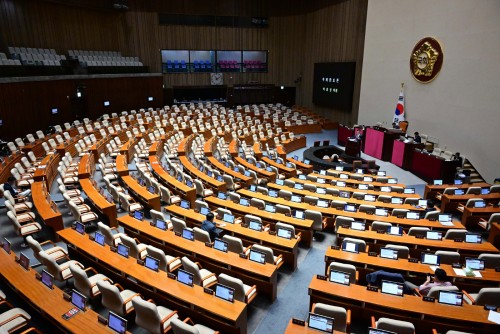 |
| Rep. Park Choong-kwon of the People Power Party conducts a filibuster during a plenary session of the National Assembly in Seoul on September 28. / Source: Byunghwa Lee |
South Korea’s Democratic Party (DP) has pushed its landmark plan to dismantle the prosecution service past a critical stage, moving closer to fulfilling its pledge of delivering results before the Chuseok holiday.
According to political sources on September 28, the revised Government Organization Act grants a one-year grace period for the prosecution’s dismantling. During this time, the DP plans to resolve internal divisions and fine-tune details such as the scope of supplementary investigative powers.
Established in 1948, the prosecution will be dissolved after 78 years under the reorganization plan. Investigative authority will be handed to a new Serious Crimes Investigation Agency (SCIA) under the Ministry of the Interior and Safety, while prosecutorial authority will move to a newly created Public Prosecution Agency under the Ministry of Justice, effectively separating investigation and indictment.
DP leader Jung Chung-rae, who campaigned on prosecution reform as his top pledge, had promised to deliver “the news of the prosecution’s abolition” to families during the holiday season. However, the process has exposed tensions, including disputes with Justice Minister Chung Sung-ho over whether placing the SCIA under the Interior Ministry would concentrate excessive power. The presidential office was eventually forced to step in and mediate.
The revised act also splits the Ministry of Economy and Finance into two agencies: a Ministry of Economic Affairs focused on the real economy and taxation, and a Budget Office under the Prime Minister’s Office, which takes over budgetary authority. The reorganization takes effect on January 2.
Still, the DP’s push to restructure the Financial Services Commission collapsed at the last moment, prompting criticism of a “half-finished reform.” Observers warn the Ministry of Economic Affairs could lose influence, as budget-setting power shifts away, while concerns mount over potential talent drain as officials seek positions at the more powerful Budget Office.
President Lee Jae-myung’s broader campaign pledge to break up the so-called “MoFia,” a cartel of elite economic bureaucrats, faces new obstacles. The success of the reform will depend heavily on establishing effective inter-ministerial cooperation through a government-wide task force led by the Prime Minister’s Office.
Meanwhile, the ruling People Power Party has condemned the reorganization as ill-conceived and is expected to press for its reversal.
Most Read
-
1
-
2
-
3
-
4
-
5
-
6
-
7





















